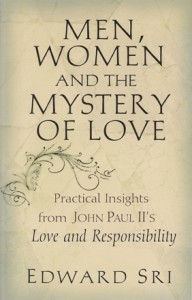Last week, I blogged about author Elna Baker, the woman who wrote an essay for Glamour called “Yes, I’m a 27-Year-Old Virgin.”
She and I would be a couple peas in a pod for that, except what she wrote didn’t explain why she is saving sex for marriage. It explained her decision to “change the rules.” Which is why a couple years later, she wrote a second sex essay for the same magazine, called “Guess What? I’m Not a Virgin Anymore!”
In one of the essays, Baker – who once had planned to save sex for marriage – said “although my virginity was a disadvantage, I stayed hopeful about dating.” She later added that after she changed her mind about saving sex, her “dating life actually improved. By not taking sex off the table right away, I made it past the four-week mark in relationships with several different guys.”
In other words, since more men dated her for longer periods of time after she decided she didn’t have to save sex for marriage, Baker deduced that what made dating difficult for her prior was the saving sex.
I could not disagree with her more, for three reasons:
1. If a person has planned to save sex for marriage and virginity strikes him or her as a disadvantage in dating, he or she perhaps has missed the point of dating.
Lots of guys like virgins. Very few like virgins who aren’t going to sleep with them. So it’s true (and I’ve discovered this by experience): fewer guys in our culture find a girl dateable who isn’t going to have sex with them before marriage.
This is a non-issue if what you intend to accomplish by dating is to meet somebody who would suit you as a spouse. If you are saving sex for marriage, somebody who doesn’t want to save sex is not suitable for you. Suck it up and move along.
The truth is saving sex for marriage while searching for a spouse in a culture of people who mostly won’t marry you if they haven’t had sex with you does, in fact, mean your relationships with most people are going to end shortly after they start. Which, according to Baker, is the disadvantage.
But a disadvantage is “an unfavorable circumstance or condition that reduces the chances of success.” So if virginity and/or saving sex is a disadvantage because it results in few dates and short relationships with people you could never marry anway, I have to ask:
What is it that you’re really trying to accomplish?
2. That people won’t date you for more than a month because you’re saving sex does not mean virginity is a disadvantage. It means you’re dating the wrong kind of people.
3. If you sincerely want to save sex for marriage, virginity is an advantage (“A condition or circumstance that puts one in a favorable position.”). And if you aren’t a virgin but you’re saving sex from now on, being honest about it with the people you meet is an advantage, too. Because realistically, your “taking sex off the table right away” means people will, in fact, walk away just as quickly. And that is not a disadvantage. It’s a quick way to discover what you set out to learn in the first place: whether this person would make a suitable spouse.

